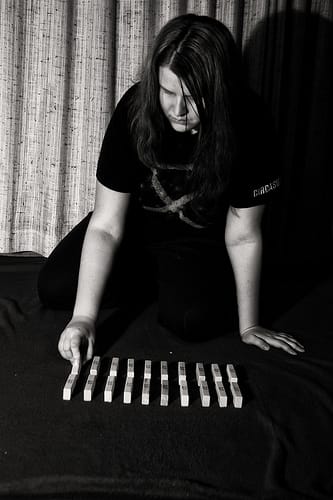Obsessive-compulsive disorder, also known as OCD, belongs to a class of mental illnesses called anxiety disorders. People with OCD feel as if bad things will happen unless they go through certain routines. In some patients, these routines and bad feelings can be severe enough to overwhelm their lives. In others, the symptoms are mild. Anxiety disorders are the most common mental illnesses among Americans; nearly one-fifth of adults struggle with one. Only 1 percent of the population has OCD, and in most cases, symptoms first show up in the late teens. However, nearly one-quarter of OCD cases begin by the age of 14. Being a teen with this disorder can be confusing, distressing and frightening. If you have a teen with OCD, understanding the symptoms and treatment options can help you both cope.
What Is OCD?
Obsessive-compulsive disorder is characterized by two things: obsessive thoughts and compulsive behaviors. Someone with OCD feels excessively worried about any number of things. These worries and concerns that something bad is going to happen seem to pop up out of nowhere and are nearly impossible to control. A teen with OCD can become easily overwhelmed by thoughts that something bad will happen to her or her family or about losing items or getting things out of order. In response to these bad thoughts, OCD teens feel compelled to go through ritualized behaviors. These are called compulsions and a teen with OCD goes through them in order to keep the bad things she fears from happening. She may also go through them because she feels they will keep things in order or keep her from losing her things. Sometimes the obsessions and compulsions are related. For instance, a teen might be afraid of germs and as a result, wash her hands hundreds of times in a day. In other cases, her fears and compulsions may not line up at all. She may, for example feel like she has to turn a light on and off a certain number of times before bed at night to protect her family from harm. The obsessions and compulsions that plague a teen can be devastating and in severe cases overtake her life.
How Does OCD Present in Teens?
If you have some concerns about your teen’s behaviors, it is important to know what to look for. Symptoms of OCD can fluctuate or get worse at stressful times. They may arise only at home and not at school. Your teen may do her best to hide her compulsions and her worries from you, making it even more difficult to understand what is happening. Here are some possible signs to look out for:
- Worries that seem irrational (i.e., worrying about getting sick when perfectly healthy)
- Worries that occur repeatedly
- Any type of compulsive action
- Distress when a compulsive action is interrupted
- An inability to rationally explain a certain action (i.e., multiple hand washings in a row)
- Trouble concentrating, especially at school or when doing homework
- Losing friends or struggling to make friends
- Low self-esteem
- Getting in trouble at school for certain compulsive behaviors
What Is PANDAS?
Although we don’t fully understand all the possible causes of OCD, researchers know that the disorder is related to brain chemistry. In particular, it seems to have something to do with the levels of a brain chemical called serotonin. Altered levels may be a result of a genetic factor, as OCD does seem to run in families. Your teen may also end up with a form of OCD called PANDAS. This stands for Pediatric Autoimmune Neuropsychiatric Disorder Associated with Streptococcus. It refers to OCD that is caused by a strep infection, not uncommon in children and teens. The strep infection itself does not trigger OCD, but the immune system’s response to the infection does. It does not happen in all cases of strep, but may be more likely in teens who have a family history of OCD.
How to Cope With Teenage OCD
If you think your teen might have OCD, it is important to get a diagnosis so that you can get her treatment. OCD is a highly treatable mental disorder, but it can get worse if left untreated. Start with your pediatrician for a referral to a good psychiatrist or psychologist. With a diagnosis, your teen can start on behavioral therapy, and possibly medications. Even with a diagnosis and treatment, coping with OCD will not be easy for either of you. Be sure the lines of communication are open and that your teen feels free to talk about what she is going through with you. Watch out for signs that her symptoms are changing or worsening and intervene as soon as possible. Get support for yourself where you can find it. Rely on family and friends to help you deal with your teen’s OCD.

